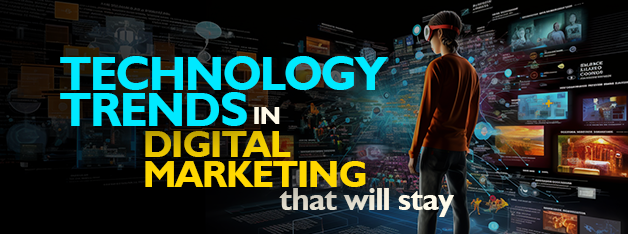Technology trends in digital marketing that will stay

Over the years, there have been a number of technology trends that have emerged in digital marketing. The last couple of years have seen the digital ecosystem undergoing a number of shifts, including an increase in online video streaming, gaming, e-commerce, tele-consultation and online learning, etc.
In this piece, we’ll look at the technological trends that will continue to shape the future of the digital landscape over the next couple of years.
1. VR & AR
The last few years have seen Virtual Reality and Augmented Reality become a mainstay of the digital marketing space.
Virtual Reality helps in creating immersive experiences that can transport users to a virtual world. Whereas, Augmented Reality helps in overlaying digital content on to the real world to create interactive & engaging experiences.
While a number of brands have experimented with both AR and VR experiences especially post the pandemic, this will continue to dominate digital marketing especially in the next couple of years. We can expect to see more brands from the fashion, lifestyle, automobile, real estate and FMCG industries explore engaging and interactive digital experiences featuring AR and VR.
2. AI & Chatbots
2023 has clearly been the year of Artificial Intelligence (AI) and Chat GPT and other Generative AI has been making waves across the globe. We will see this technology trend continue to dominate especially when it comes to Chatbots and conversational Artificial Intelligence.
According to Drift’s State of Conversational Marketing report, almost 42 percent of consumers use conversational AI and chatbots for purchases. The following years will see small businesses, especially from the MSME segment adopt AI and WhatsApp-based Chatbot solutions to manage their customer service as well as marketing requirements.
3. Personalization
Personalization refers to the strategy of data analysis and digital technology to deliver highly tailored messaging and product offerings to customers. This helps in not only reaching out to customers with a more personalized brand message but also crafting personalized content and offers that are tailor-made for the audience.
Personalization is possible through machine-learning algorithms which identify customer data and discover emerging trends & patterns to recommend personalized content and offers. This is a technology trend that will continue to be explored by both large and small businesses, in the years to come.
4. Metaverse
While many marketers have written off the Metaverse due to factors such as lower adoption rates and the high costs involved in development, this is one trend which will make a comeback in the following years.
In the coming years, the Metaverse will bring together AR, VR and AI to create an immersive 3D experience that blends the virtual and the real world giving users the opportunity to experience clothes, fashion & lifestyle accessories, cars, technology gadgets and more.
Additionally, we will also see manufacturing and other industries create a ‘digital twin’ version of their plants & factories for training employees and other simulation related activities.
5. AI @ Work
The next few years will see nearly every task at the workplace being augmented by AI. This could range from employees using Chat GPT to draft an email or businesses using the power of no-code AI to automate complex processes, build new products and test and iterate concepts, without requiring any knowledge of coding or scripting languages.
Some of the industries which will benefit from AI include Retail which will use low-code or no-code AI for automating and managing their inventory management systems.
